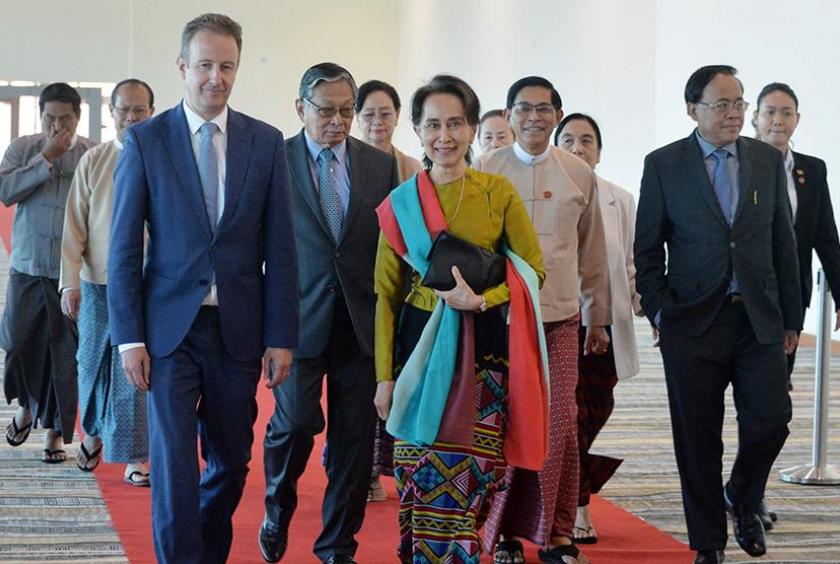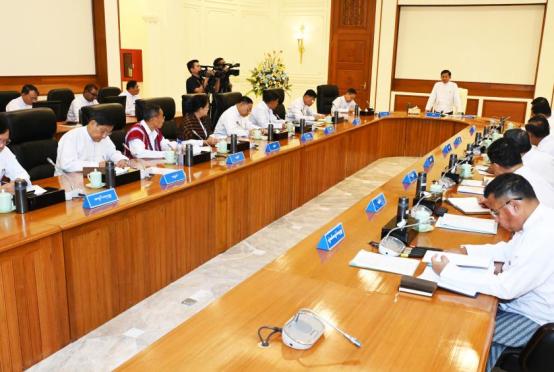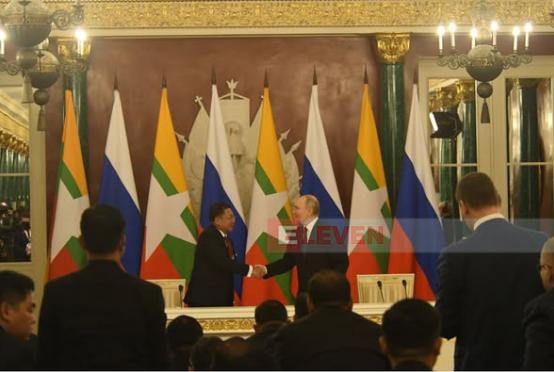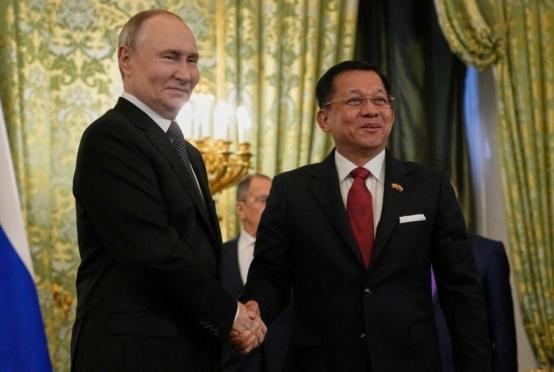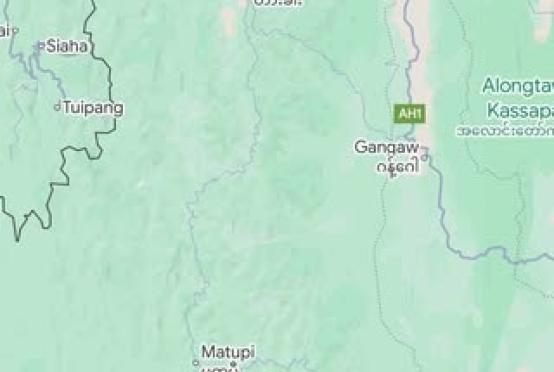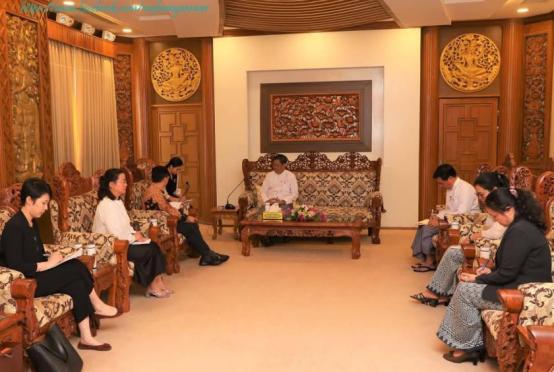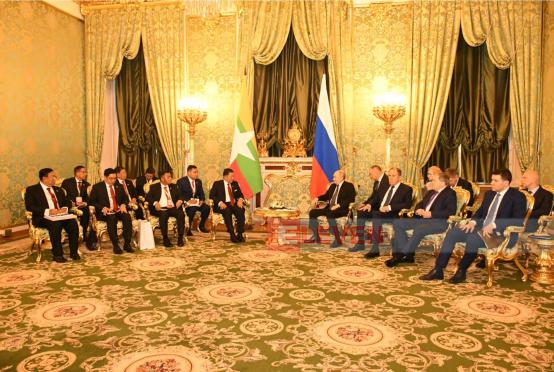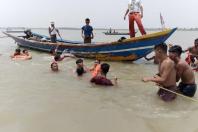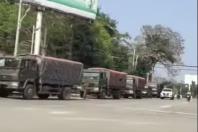Gambia has filed a case against Myanmar at the International Court of Justice (ICJ), accusing that Myanmar security forces committed genocide against Bengalis or caused mass exodus of Bengalis during the conflicts in northern Rakhine in 2016 and 2017.
Gambia filed a genocide lawsuit against Myanmar on behalf of the Organisation of Islamic Countries (OIC), formed with 57 countries. Bangladesh played an important role in opening the case against Myanmar.
This is the first genocide case at the ICJ since the 1990s.
In late May, Foreign Affairs Minister of Gambia failed to attend the annual meeting of the OIC held in Bangladesh. However, Gambia sent Minister of Justice and Attorney General, Abubacarr Tambadou to the meeting.
Tambadou has been involved in filing the 1994 Rwandan genocide cases for over a decade.
He is also part of the OIC delegation that the refugee camps in Cox’s Bazar.
Myanmar authorities, including Nobel Peace Laureate Daw Aung San Suu Kyi who leads the civilian government, have denied almost all accusations against Myanmar. Myanmar said it officially carried out counter-terrorism military operations.
Tambadou submitted a proposal to form an OIC committee for an investigation into accusations of genocide against Bengalis. The approval of that proposal by the 57-member OIC puts the small western African county at the center of the highest profile in the international judiciary.
Gambia’s judicial team will face the Myanmar delegation led by Daw Aung San Suu Kyi, at The Hague on December 10-12.
Tambadou asked the International Court of Justice to urgently order measures “to stop Myanmar’s genocidal conduct immediately and to uphold and strengthen the global norm against genocide that is binding upon all states.” Myanmar has also indicated that it will defend the case.
In 2012, there were conflicts between the two communities in Rakhine State. In November, 2013, the delegation from the OIC visited Bengalis refugee camps in Rakhine State.
During this tour to Myanmar, the OIC delegation tried to open an OIC office in Myanmar, but the OIC’s aim to open its office did not materialize due to nationwide protests.
However, the OIC has been trying in every possible way to achieve its goals quietly. It can be said that the problems Myanmar is facing on the international stage is the result of the actions initiated by the OIC.
The ARSA’s terror attacks in northern Rakhine in 2016 and 2017 reflected the political agenda of OIC. It is assumed that the OIC provides assistance to the ARSA.
U Thein Tun Oo, Executive Director of Thayninga Institute for Strategic Studies says: “After doing research on how ARSA is able to operate sustainably for a period of time, I have my suspicions that they are linked to the OIC, especially to the ISIS in the Middle East. when I look at the facts that who can provide assistance to them for such a long time. What I can say with certainty is that the OIC provides assistance for this case.”
Thayninga Institute is an organization conducting studies on Rakhine State affairs.
The OIC is the second biggest organization in the globe after the UN. The OIC is formed with 57 member countries from four continents and is over 40 years old.
The formation of OIC aims to solve the difficulties that Muslims face around the globe.
By protocol, foreign affairs ministers make decisions for the OIC. The members of the council meet regularly every year. For important issues, the council’s members meet every three years.
The member countries contribute funds for the OIC, but alsoaccepts separate donations. Of the OIC member countries, Saudi Arabia and Iran have the highest donor contributions.
After the 9/11 Attack in the U.S, the OIC reviewed its mission. The OIC held a global Muslim meeting. In 2015, the OIC laid down a 10-year strategic plan.
In his speech, Ekmeleddin Ihsanoglu, Secretary of the OIC, said: “The strategic plan covers the fight against terrorism, disappearance of Islamophobia, poor management, and wide economic gap. It also includes plans to fight poverty, lack of education, corruption, and inequality.”
“Being unable to solve these matters would force Muslims who are facing difficulties, to become extremists,” Ekmeleddin Ihsanoglu added.
Ekmeleddin Ihsanoglu is a Turkish citizen. Turkey wishes to build a relationship with the ASEAN community. Building relations with Indonesia and Malaysia in ASEAN in the form of assistance for Muslims is a very important geopolitical matter for Turkey.
As such, Turkey is demanding the rights for Bengalis by urging the UN, the OIC,and human rights groups. Getting citizenship status for Bengalis in Rakhine State is a vital aspirations for Turkey.
Turkey wants to enable Bengalis in Rakhine State to get citizenship status as quickly as possible. With the help of organizations such as the UN and the OIC, Turkey wants to step up its efforts and puts the pressure on the Myanmar government. Some committees under the UN make demands even for granting citizenship status vividly.
At the UN committee meeting held in 2017, Saudi Arabia's U.N. ambassador, Abdallah Al-Mouallimi, speaking on behalf of the OIC, said “another inhumane scene” of religious hatred is unfolding in Myanmar, forcing nearly 620,000 Rohingya Muslims to flee to Bangladesh.
The UN does not put pressure on other countries though there are 150 Geneva convention countries. The UN is putting strong pressure on Myanmar about Bengali affairs, at the instigation of the OIC.
Finally, Gambia filed a case against Myanmar, at the International Court of Justice (ICJ), on behalf of the OIC on November 11. On November 13, human rights groups in the UK also opened a case against State leaders at the court in Argentina.
On 14 November 2019, Pre-Trial Chamber III of the International Criminal Court ("ICC" or the "Court") authorised the Prosecutor to proceed with an investigation for the alleged crimes within the ICC's jurisdiction in the situation in the People's Republic of Bangladesh/Republic of the Union of Myanmar ("the situation in Bangladesh/Myanmar"). It is not a normal coincide as three cases occurred within a week.
In 2016, the ARSA carried out a terrorist attack on some police outposts in Yathaedaung Township in Rakhine State in 2016. In 2017, the ARSA attacked 30 border police outposts including the military headquarters in Buthidaung and Maungdaw region in August, 2017.
Myanmar security forces had to carry out operations there due to the ARSA’s terrorist attacks. The fights between the security forces and the ARSA forced around 600,000 Bengalis to flee to Bangladesh.
Even though ARSA killed hundreds of Hindus and some local ethics, the UN and the OIC opted to l turn a blind eye to such terror killings.
This is due to the fact that the ARSA is trying to implement the OIC’s political agenda through terrorism, amongst which are well-written political stories.
Myanmar’s government had expressed disappointment at the lack of effort behind cooperation from Bangladesh despite mutual wishes to repatriate the Bengalis that had fled from the conflicts.
Despite extensive partnerships with many UN groups as well as Asean member countries, the political pressure and threats put on the refugees that wants to return to their homes has led to a slow repatriation process.
There is also the need to form a group, made up of representatives from Asean countries, China , and India, that can fully observe the repatriation process at all times.
The criterias for the repatriation process are respect for human rights and citizenship verification process that is wholly accurate and swift within the boundaries set by the 1982 citizenship laws.
For those that have returned, Myanmar must guarantee their safe and voluntary return as well as safe continued livelihoods. For many, this is the key, critical importance for the entire repatriation process to succeed.
The ICJ was first initiated in 1945 according to a UN agreement and came alive in 1946 in order to handle country-to-country lawsuits.
The ICJ, made up of 15 international legal experts, is a selection chosen by the UN’s General Assembly and the UN Security Council every nine years.
The State Counsellor Aung San Suu Kyi has left for The Hague, Netherlands in order to defend the country against Gambia’s lawsuit.
According to the BBC’s interview with former Law Professor Dr Myint Zan, the current state of the ICJ lawsuit does not to decide whether Myanmar is guilty of violating terms as per the UN’s genocide convention.
However, Myanmar has to stop the alleged on-going genocide, to not destroy evidence relating to genocide , and for Myanmar and Gambia to both settle this issue amicably without letting the legal affairs worsen.
The decision from the ICJ will depend on votes from the tribunal of judges. If there are 17 total judges that will preside over this case, at least nine judges must agree to heed either Gambia’s accusations or Myanmar’s defense.
Dr. Myint Zan also claimed that Myanmar could simply deny, just the same as other countries that have been put on trial on the ICJ, that the ICJ does not have the jurisdiction to pass judgement upon Myanmar as well as fight on the point that Gambia is not in the right standing to accuse Myanmar in the ICJ at all.
On top of that, he also mentions Myanmar can deny the so-called evidence held by the UN’s organisations and Gambia were all reported from a Fact-Finding Mission, a group officially recognized by Myanmar, which therefore invalidates itself as per ICJ’s rules.
Myanmar can also claim that an official report will soon be published in regards to undertakings by the fact-finding mission, proposing to the ICJ to snub Gambia’s legal ammunition.
The soon-to-occur trial at the ICJ will not decide whether Myanmar’s government is held responsible for genocide accusations but for the government to provide clarification upon the current status of things. If Myanmar’s official explanations are not accepted, it will be Myanmar’s win in this legal bout, according to Dr. Myint Zan.
He also quoted one of Gambia’s lawyers on the fact that this case will take at least three years if the ICJ decided to move ahead with the case while ignoring Myanmar’s rebuttals.
According to the aforementioned excerpts from the BBC’s interview with Dr. Myint Zan, Myanmar is currently not in a position to take a lethal legal blow, albeit some damage to Myanmar’s reputation in the international community.
To summarize, Gambia had sued Myanmar under grave accusations but the ICJ is not in a position to seriously harm Myanmar.
But while the government grapples with the ICJ, the current state of internal disunity and resulting political vulnerabilities will be undoubtedly targeted by the OIC.
Behind OIC’s strategic strikes, Western powers such as the US's influence can be felt on top of the blazing global power struggle between China and the West mean Myanmar is the latest proxy nation.
As far as Myanmar’s proxy status goes, there seem to be three key agendas behind the concerted offensives: the reduction of China’s influence on Myanmar, the destruction of Myanmar’s military and Buddhism.
Of these three interconnected agendas, the second and the third is looking to be Myanmar’s lifeline, the deaths of which can mean Myanmar’s imminent collapse.
Thus, Myanmar’s internal affairs must head towards unified existence in order to withstand external pressure but it is rather lacking to say the least.
But there are shows of support to the State Counsellor’s endeavor to at the ICJ, not only from the civilians but also amongst the many armed ethnic groups that haveissued statements that agree with the government’s actions concerning the genocide lawsuit.
But some armed groups, such as the alliance of Ta’ang National Liberation Army (TNLA), Kokang’s Myanmar National Democratic Alliance Army (MNDAA) and Rakhine’s Arakan Army (AA) have issued statements that agree to the ICJ’s efforts, claiming that it was to punish the Myanmar military.
Shortly after the statements were released, there were rumors that Chinese officials called the top brass of those three armed groups for a meeting on December 5 to warn them of their actions.
After those rumors, the three allied armed groups including the United Wa State Army (UWSA), issued new statements that retract their earlier words - now wholly agreeing with the government.
It should be noted that the TNLA, MNDCC and the AA are a part of the Federal Political Negotiation Consultative Committee (FNPCC), a group led by the Wa’s UWSA.
China had always stood with Myanmar in the international front, a staunch objector actions that the UN want to impose on Myanmar.
The UWSA’s stance, a group that thrives in Myanmar-China border regions, can essentially be called China’s stance. Myanmar must take extreme care not to get grounded to dust between global-butting-heads-powers.
It is expected by many that Myanmar will make a strong stance and retort harshly at The Hague when the hearing for Rakhine State’s affairs take place on December 10 as the military had supplied facts and information to the government for defensive use while the military continues its investigations into all matters concerning Rakhine affairs.
A unified front of both the civilian government and the military must lead the people of Myanmar to protect national interests in such a time.
The military’s Commander-in-Chief General Min Aung Hlaing has claimed that the statement which proclaims the country’s military must be strong for the nation to be strong will always be true at the graduation ceremony of batch 61 of Pyin Oo Lwin’s Defense Services Academy on December 6.
He also stated that all members of the military have sworn to give up their lives to be loyal and dutifully carry out the defense of the military’s creed to keep the union, unity between all ethnicities and endurance of sovereign power.
As of now, the ICJ’s Myanmar vs Gambia have been announced to proceed as follows (all timestamps in Myanmar’s GMT +6.30) ; on December 10, Gambia will put forward their case from 3p.m. to 6p.m. Myanmar will present its defense the next day 3p.m. to 6.30p.m.
Gambia will then have its turn on December 12 during 3.30p.m. to 5p.m. with Myanmar’s defense following again from 10p.m. to 11p.m.
According to Thayninga’s Thein Tun Oo, “While there is seemingly no serious risk involved with the ICJ hearing, there is a possibility that Myanmar’s political image will plummet if the defense does not prepare sufficiently and make mistakes or contain wrong information. That is worrying.”
He also remarked that in the global arena, even the US is struggling against its battle with the powerhouse Chinese economy that is looking to expand its influence.
“In truth, this is a game of interests between two global powers and it so happens that Rakhine State, especially northern Rakhine State areas such as Maungdaw and Buthidaung have become pieces on their board. It’s become the nutrition for the two to out-muscle each other.”
He also went on to claim that Myanmar must take more care towards handling international relations, especially on how to deal with allied nations and what information are to be provided to the international community.
“The critically important point is still Myanmar’s national interests. A grand strategy must be formulated on how best to precisely carry out national and citizen interests. Otherwise it will be a matter of temporary alliances; we will have to cooperate with this nation or that nation when other this or that nation pressure us. We will be spending all our time doing that on top of all the ongoing conflicts that there simply will not be sufficient amount of effort invested into development,” said Thein Tun Oo.
What is the ICJ?
The ICJ is often called the World Court as it is the UN’s primary legal department that carry out two main tasks.
The first is to serve as the legal intermediary between two nations if there is ever a feud he second is to be the global gathering of legal intelligence on how best the UN and its members can conduct their businesses within international laws.
Gambia is now suing Myanmar for supposed breach of the 1948 Genocide Convention for the Prevention of and Punishment For the Crime of Genocide, a convention agreed and signed to by Myanmar.
The UN agreement dictates that Myanmar, a member of the UN since 1956, must prevent and punish genocidal actions as it is deemed criminal under international laws.
How did Gambia became the plaintiff nation?
Gambia is a small, western African nation. According to the US’s ICF report, Gambia’s population consists of 95 per cent Muslims and is also a part of the OIC’s 57 member nations.
A part of the International Criminal Court (ICC) is, in fact it's Chief Prosecutor, Fatou Bensuda. She is a Gambian national and a part of the ICC that has allowed for a probe into matters regarding Northern Rakhine State conflicts.
Gambian’s Minister of Justice and Attorney General, Abubacarr Tambadou, a UK graduate, is a prominent veteran of Rawanda genocide case for the ICC.
He claimed that the world will not stand by and watch while atrocities are being committed, thus launching Gambia as the prosecuting nation against Myanmar.
Myanmar persecuted: who are the targets?
While the ICJ lawsuit encompasses the whole nation, Permanent Representative of the Republic of the Union of Myanmar to the United Nations Hau Do Suan said “ Since a lawsuit between two nations will be handled by the governments, my opinion is that it is a case against the government itself. But a legal expert’s views might differ.”
Difference between the ICC and the ICJ
The ICJ only accepts country-to-country lawsuits and not from persons, organizations and groups. Thus the OIC cannot directly sue Myanmar but through Gambia. It also serves as the legal intermediary platform between nations as well as the go-to place for legal advice when it concerns international laws.
The ICC, however, can target each individual suspected of breaking genocide rules, wartime criminal activities and other affronts against humankind. It decides which person is responsible for the crimes.
It also decides whether said individual is guilty or innocent of which if found to be guilty, the ICC will also sentence on the manner of punishment.
The ICJ, even if it had decided that a country is guilty of breaching international conventions, cannot or finds it extremely difficult to punish individuals.
What exactly is Myanmar facing?
The ICJ has so far handled the infamous genocide of Bosnia and Herzegovina’s Muslims, a case with plenty of evidence. It decided that Serbia was responsible for the Srebrenica Genocide, not because it was complicit in it but for breaching the Genocide Convention by failing to prevent it.
Founder of Legal Aid Network, Human Rights Lawyer Aung Htoo had answered to the BBC that “ICJ decided that the International Criminal Tribunal for the Former Yugoslavia (ICTY) had failed to transfer General Ratko Mladi, thus breaking the terms of the Genocide Convention, also deciding the Bosnia and Herzegovina’s demand at monetary compensation was not related to the case. It demanded that the ICTY send wanted individuals from Serbia to be tried. If we look at that case, the ICTY had already decided on which generals or groups were responsible. For Myanmar, the ICC is still trying to build a case. If the trial at the ICJ goes well for Myanmar, what the ICC is trying to do may get impacted. Even if Myanmar was deemed guilty of braeching the Genocide Conveition, it is very uncertain as to who or what group will be even punished.”
Some facts about the UN Charter and ICJ
The UN Charter claims that all member nations must adhere to rulings decided by the ICJ as per Article 14, Chapter 94.
The same article dictates in Chapter 92 that the ICJ is the primary legal arm of the UN while Chapter 93 states that only member nations are to be subject to the international laws.
However, it also claims that even non-member nations can be prosecuted as per agreement from the Security Council or depending on rules concerning a case-by-case basis.
It also goes onto claim that if violations to duties as ordained by the agreement were found in one of the parties involved in a lawsuit, the Security Council can decide on how to best proceed.
Article 96 of the charter also says that any and all things concerning legal advice or consultation can be sought with the ICJ. In regards to the legal authorities of the international court, it is stated that the ICJ must only handl nation-to-nation cases and that international organizations serving the public’s interest can also request information from the ICJ as well as submit it to the ICJ, upon which the ICJ must receive it as evidence.
The court can also hold trials or consult on cases given to them at any time in regards to any individual, group, department, commissions - any manner of organisation.
ICJ and the Security Council
According to Article 94 of the charter, all member nations must comply with the decisions made by the court. Otherwise, it will be submitted to the Security Council.
There are several distinct problems with this procedure.
If the court’s decision goes against the wishes of just one of the five permanent members of the Security Council and their allies, the decision will be rejected via veto power. An example is the case between the US and Nicaruga. The US did not care for the decision of the court, ultimately bringing it to the Security Council. The council also cannot further pursue pressure to force a country to accept the decision of the court if one of the council’s members had vetoed against the court’s decision. While there exists Article 7 for the Security Council to take harsh action, it also largely depends on the delicate balance of the global peace and security scale. So far, the Security Council has not intervened in such manner yet.
In further analysis of the division of power between the ICJ and the Security Council, one must look at the Pan Am case from 1992. Libya had requested ways to protect itself in advance to the court as it had accused the UK and the US of threatening with economic sanctions, breaching Libya’s rights. It spawned conflict between the two; with the court deciding against Libya with 11 for and 5 against vote. It was due to the fact that, as per the Montreal Convention, Libya’s request needed the express order of the Security Council.
Duties as demanded by Article 103 is still very much dependent on the procedures and agreements between all other nations.
In the case of Nicaruga, it was decided by the court that there was no need for there to be differences between the ICJ and the Security Council’s decision. In any case, it is rather apparent that the scales tip heavily in favour of the Security Council if it ever comes to a disagreement between the ICJ and the Security Council. While the Security Council can be requested to intervene in international court cases, it ultimately depends on whether the council deems it necessary.
Despite the international court’s decision that is supposed to be final with no further chance for appeal, a country that has lost a lawsuit but refuses to oblige to the court’s rulings must be dealt with by the Security Council that can explicitly deny to do so.
In another example, the US is bound to compulsory jurisdiction as per the 1946 laws. But the US decided to abdicate itself from compulsory jurisdiction after the court decided that the US had been involved in unlawful usage of force, requesting the US to stop. The US was also ordered to compensate Nicaruga.
The two powers to stand with Myanmar
As of now, there are two global powers that will stand with Myanmar - China and India. China holds veto power in the Security Council. Both are staunch trade partners as well as largely intertwined in terms of the global political sphere such as each country’s problems with the Muslim population. The West’s support of the OIC’s pressure on Myanmar is directly related to also pressuring China and India. It is an agenda of The West to always keep in check China’s political and economic influence. They stand to protect their own interests if they stand with Myanmar.
China and Xinjiang’s Uyghurs
One of China’s possible interests is the Uyghurs people from Xinjiang Autonomous Region. Controversies surrounding the Uyghurs made a lot of waves the previous year.
On September 14, 2018, Amnesty International published a report that demanded of China clarification the fate of around one million Uyghurs in Xinjiang . Observers have commented that China’s forced confinement of the Uyghurs, many of them deemed as Islamic Extremists and Separatists, actually serves to fuel the fire.
The so-called Re-Education Camps where around one million Uyghurs were kept was condemned by the US Secretary of State Mike Pompeo as “the stain of the century” on September 21.
Canada also harshly criticized China on September 25 with Prime Minister Justin Trudeau claiming at the sidelines of the UN General Assembly that everytime he sat with world leaders, it was also the human rights issues that are to be concerned about. Canada’s Foreign Minister Chrystia Freeland also met with the Chinese Foreign Minister Wang Yi on September 25, 2018 - a meeting which Freeland used to highlight the Uyghurs issue.
On September 28, Wang Yi stated that matters related to Xinjiang were a matter of national security, claiming it is not as human rights groups and Uyghurs activists have said but instead a matter of beneficial national policy.
He states that since a few years back, there no longer were any terror attacks and that the population of 20 million living in Xinjiang support the government’s efforts because they felt safer sleeping at night.
There is a long and sordid history between the Xinjiang Autonomous Region’s Uyghurs and the Chinese authorities. Xinjiang is not only the largest autonomous region but also borders Mongolia, Russia, Kazakhstan, Tajikistan, Afghanistan, Pakistan and India. Most of the population are the Uyghurs.
Most Uyghurs are of the Islamic faith and treat it as their most important trait and national interest. The Uyghur language is similar to Turks from Turkey and consider themselves most close in culture to the Central Asia region.
India and Kashmir
India’s Hinduist government ordered the retraction of autnomonity from Kashmir Region after decades upon decades on August 6, 2019.
It prompted many worries that Kashmir will again be washed in social and political turmoil as it was home to majority Muslim population.
India then reinforced security in Kashmir region with the President himself voiding the Article 370, a clause that grants autonomy to Kashmir, of the constitution mere hours after the announcement. India also removed the rule that disallows those not living in Kashmir to purchase property in Kashmir, which in turn was to allow other Indians to settle as well as perform government duties in Kashmir.
It was a move that was criticized by the Pakistani Prime Minister, calling it a direct breach of the UN Security Council’s rules.
India and Pakistan have been sharing tense control of the region for a long time with both sides claiming that they both have full control over the region. Three times India and Pakistan have gone to war, with two times directly due to Kashmir.
On top of that, India cracked down on citizenship status on September 1, 2019. The national registration drive had reportedly left around 1.9 million people living in Assam State without citizenship status. Around three million people live in Assam and the decision by the Indian government was targeted to remove those that had entered India through illegal immigration from Bangladesh.
Since 2015, those living in Assam were to show that they have been living in India before the Bangladesh Liberation War began in March 24, 1971. Those that could prove so was considered citizenship status.
The Indian Cabinet had also approved a draft that allow several small religious minority groups citizenship rights but explicitly exclude Muslims on December 4. Observers and critics have claimed this move as a renewed attempt to push out around 200 million strong Muslim popluation in India.
The elections in May saw yet another landslide victory for Prime Minister Narendra Modi’s BJP, a party that had long been accused of being mainly driven by a Hindutva agenda, in other words being a Hindu religion nationalist political party.
Modi’s cabinet had passed the draft that will amend the citizenship law that had not changed for 60 years on December 4 and will see it put through to the lower house this week. According to the draft, religious minority groups, such as Hindu, Buddhist, Sikh, Christians, Jains and Zoroastrians, that had fled from Muslim majority countries, such as Pakistan and Afghanistan, will be guaranteed citizenship even without supporting documents.
The BJP had claimed that the reason why Muslims were excluded from the list was because they could seek refugee in many Muslim countries across the globe.
Senior Minister Prakash Javadekar said that this bill adheres to fairness and isn’t in direct persecution of any individual to the press.
The Modi led government had once tried to pass a similar bill but failed from the lack of approval in the upper house. Many are also skeptical that it will get approved this time around.
All this had led to growing dissent in the East-Northern Indian region but also toward the Muslim population as many believe that migration from all sorts of religious and ethnic minorities had been coming to the East-Northern region of India.
India’s Home Affairs Minister Amit Shah, considered to be Modi’s right hand man, will meet with representatives from areas in the aforementioned region for a discussion on December 6. Amit Shah, a prominent supporter of the amendments to the citizenship law, had outright claimed that he wanted to save the lives of religious minority groups that face persecution from majority Muslim neighboring countries.
Summary
In summary, Gambia’s started this lawsuit in lieu of the 57 member strong OIC in an attempt by Islamic countries to pressure the Buddhist majority Myanmar.
OIC and the West have smeared Myanmar for genocide and breach of human rights in order to serve their interests.
According to analysis from lawyers and legal experts, it is difficult for the ICJ to achieve quick action on Myanmar as laws dictate a systematic and time-consuming process instead. While Myanmar undergoes the ICJ scrutiny, the nation must solve the Bengali issue.
They must be allowed to return to Myanmar in a safe, dignified, and in a willing manner while also ensuring their survival upon their return amongst a plethora of guarantees. Myanmar must work together with neighboring powerhouses such as China and India as well as those in the Asean region.
The solutions must also be a unified effort that will not harm the sovereign power of the nation. The country must be aware of the dangers posed by the OIC. The issue is something that can only be solved worry-free by basing it on the facts via cooperation from the civilians, the civilian government and the military.
Based on the interview by Dr. Myint Zan on BBC News, apart from the steep decline of Myanmar’s international reputation, Myanmar’s trial at the ICJ is unlikely to produce any other serious consequences.


